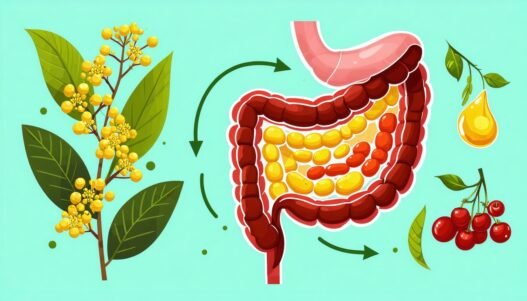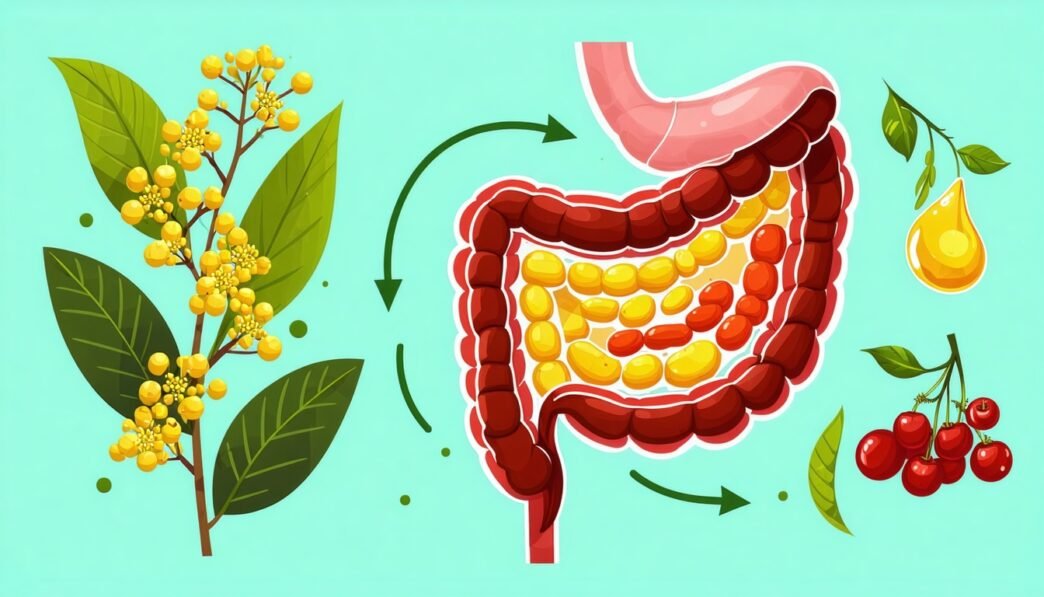Understanding Berberine
Introduction to Berberine
Berberine is a natural compound that has been utilized in traditional Chinese and Ayurvedic medicine for thousands of years. It is derived from various plants, including Berberis species. Recent studies indicate that berberine may offer multiple health benefits, particularly in the realm of metabolic health. It has been researched for its potential roles in treating conditions such as diabetes mellitus, obesity, and cardiovascular diseases Medical News Today.
Berberine functions by affecting various biochemical pathways in the body. Its mechanism of action is believed to be linked to its impact on the gastrointestinal microbiota, which can play a significant role in metabolic disorders. Ongoing clinical trials are exploring berberine’s effectiveness in treating cardiovascular, gastrointestinal, and endocrine diseases with clinically meaningful outcomes and low toxicity levels NCBI.
Therapeutic Applications
Berberine has been recognized for its wide array of pharmacological properties and therapeutic applications. It is commonly used for:
| Condition | Description |
|---|---|
| Diabetes Mellitus | Berberine can help lower blood sugar levels and improve insulin sensitivity. |
| Hyperlipidemia | It has lipid-lowering effects that contribute to a healthier lipid profile. |
| Metabolic Syndrome | Berberine can manage various aspects such as obesity and insulin resistance. |
| Polycystic Ovarian Syndrome (PCOS) | It may regulate hormones, which could be beneficial for women with PCOS. |
| Liver Disease | Berberine has shown promise in improving conditions like non-alcoholic fatty liver disease (NAFLD) NCBI. |
By influencing the gastrointestinal microbiota, berberine possesses the potential to improve gut health alongside its advantages in treating metabolic disorders. For those interested in understanding more about the effects of berberine, including its relationship with gut health, explore our article on what does berberine do to the gut?.
This compound’s multifaceted nature highlights its importance in functional medicine and holistic wellness, making it a relevant topic for anyone keen on exploring natural health solutions.
Impact on the Gut Microbiota
Berberine’s influence on gut microbiota is a significant aspect of its health benefits, particularly for those interested in holistic wellness. Understanding how it works can reveal valuable insights into what does berberine do to the gut?
Modulation of Gut Bacteria
Berberine has been shown to have a profound impact on gut bacteria. It can inhibit the growth of certain harmful intestinal bacteria while promoting beneficial strains. Research indicates that berberine affects the composition of intestinal flora by increasing populations of beneficial bacteria such as Bacteroides, Parabacteroides, and Blautia, while reducing harmful bacteria (NCBI).
| Effect of Berberine on Gut Bacteria | Beneficial Bacteria | Harmful Bacteria |
|---|---|---|
| Increase | Bacteroides | Pathogenic species |
| Increase | Parabacteroides | |
| Increase | Blautia | |
| Decrease | Intestinal pathogens |
This modulation can lead to improved overall gut health and potentially mitigate metabolic disorders associated with dysbiosis (an imbalance in gut microbiota).
Influence on Gut Health
The effects of berberine extend beyond mere modulation; it plays a critical role in promoting gut health. By affecting the intestinal flora composition, berberine contributes to a reduction in hyperlipidemia and improves cholesterol levels Healthline. This adjustment in gut microbiota can help in reducing the risk of diseases related to poor gut health.
Moreover, the enhancement of beneficial bacteria through berberine’s action can lead to better digestion, improved nutrient absorption, and a stronger immune response. As berberine interacts with gut bacteria, it fosters an environment that aids in metabolic health, thereby benefiting conditions like diabetes and obesity.
Individuals interested in exploring the benefits of taking berberine can look into its influence on the gut as a transformative aspect of its therapeutic potential.
Health Benefits of Berberine
Berberine is gaining recognition for its wide-ranging health advantages, particularly regarding metabolic health, cardiovascular effects, and potential anti-cancer properties. Understanding these benefits can provide insight into why many individuals are exploring its use in their wellness routines.
Metabolic Disorders
Berberine has been utilized traditionally in China to manage conditions like obesity, diabetes mellitus, and metabolic syndrome. It works by effectively regulating blood glucose levels and improving insulin sensitivity. Studies indicate that berberine reduces blood sugar levels through various mechanisms, including modulation of gut microbiota composition, which has been linked to metabolic regulation (NCBI).
| Metabolic Effect | Description |
|---|---|
| Blood Sugar Regulation | Helps lower blood glucose levels, making it beneficial for diabetes management. |
| Lipid-Lowering | Reduces total cholesterol, triglycerides, and LDL cholesterol while increasing HDL cholesterol. |
Heart Health Effects
The cardiovascular benefits of berberine are notable. Clinical trials indicate its efficacy in reducing hyperlipidemia—abnormal levels of fats in the blood—by positively impacting the composition of intestinal flora. Berberine enhances the levels of beneficial bacteria, which contributes to improved lipid profiles and overall heart health (NCBI).
Further research supports that berberine can lower serum levels of cholesterol and triglycerides, associating it with reduced risk factors for heart disease.
| Cholesterol Effect | Impact |
|---|---|
| LDL Cholesterol | Reduces levels of harmful low-density lipoprotein (LDL) cholesterol. |
| HDL Cholesterol | Increases healthy high-density lipoprotein (HDL) cholesterol. |
Potential Anti-Cancer Properties
Emerging research suggests that berberine may also possess anti-cancer properties. Its mechanism of action appears to include modulation of gut microbiota, which plays a pivotal role in cancer prevention and treatment. Studies are exploring the potential of berberine in targeting cancer cells and suppressing tumor growth, though more research is necessary to fully understand its capabilities (NCBI).
In summary, berberine demonstrates a multi-faceted approach to health, showcasing benefits that extend from metabolic regulation to heart health and even potential anti-cancer effects. For those interested in further exploring the implications of berberine use, additional resources on what are the benefits of taking berberine? can provide deeper insights.
Berberine and Metabolic Health
Berberine has garnered attention for its potential benefits in enhancing metabolic health. Research highlights its effects on blood sugar regulation, weight management, and lipid profile improvement, making it a subject of interest for those exploring holistic wellness options.
Regulation of Blood Sugar
Berberine has been shown to significantly lower blood sugar levels and improve insulin sensitivity. In clinical studies, individuals with type 2 diabetes experienced a notable reduction in fasting blood sugar levels and HbA1c when taking berberine. For instance, one study with 116 diabetes patients indicated a 20% reduction in fasting blood sugar levels when participants consumed 1 gram of berberine daily (Healthline).
| Study Details | Result |
|---|---|
| Sample Size: 116 Individuals | 20% reduction in fasting blood sugar levels |
| Dosage: 1 gram of Berberine per day | Significant improvement in HbA1c |
Weight Management
Research suggests that berberine may assist in weight management efforts. It can lower body mass index (BMI) and fasting blood insulin levels, enhancing an individual’s ability to regulate their weight. Additionally, berberine is believed to activate metabolic pathways, including proteins such as SIRT1 and AMP-activated protein kinase, which play crucial roles in fat metabolism and energy regulation. The modulation of gut microbiota through berberine also contributes to better weight management by improving nutrient absorption and reducing inflammation.
Lipid Profile Improvement
Berberine exhibits promising effects on lipid profiles, helping to manage cholesterol levels and reduce cardiovascular risks. Studies have found that berberine can lower LDL cholesterol, total cholesterol, and triglyceride levels while boosting HDL (good) cholesterol levels. These changes may contribute to a decreased risk of heart disease, owing to its role in improving metabolic health and energy regulation in cells.
| Lipid Levels Change | Effect of Berberine |
|---|---|
| LDL Cholesterol | Decreased |
| Total Cholesterol | Decreased |
| Triglycerides | Decreased |
| HDL Cholesterol | Increased |
Berberine’s capacity to influence metabolic health through these mechanisms provides insight into the question of what does berberine do to the gut? Not only does it demonstrate significant effects on blood sugar regulation and weight management, but it also improves lipid profiles, making it a beneficial addition to a health-conscious regimen. For those interested in the holistic approach to wellness, understanding the impact of berberine can be vital.
Clinical Studies and Findings
Berberine has been the subject of numerous clinical studies aimed at understanding its effects on various health conditions, particularly those relating to metabolic health and gut microbiota. This section highlights the findings from significant trials and studies regarding berberine’s benefits and therapeutic effects.
Berberine in Clinical Trials
Research indicates that berberine has been employed in China for treating several serious conditions including obesity, diabetes mellitus, atherosclerosis, and metabolic disorders. Ongoing clinical trials are exploring its efficacy in cardiovascular, gastrointestinal, and endocrine diseases. Results have demonstrated clinical benefits at standard doses with low toxicity. Notably, berberine’s mechanism for lipid-lowering and improving insulin resistance may be linked to its impact on the gastrointestinal microbiota.
| Condition | Clinical Benefits |
|---|---|
| Diabetes | Lowered blood sugar levels |
| Obesity | Decreased body weight |
| NAFLD | Improved hepatic fat content |
| Hyperlipidemia | Enhanced lipid profiles |
Human Studies on Berberine
Several studies underscore berberine’s efficacy for human health, especially in individuals with metabolic disorders. For example, one study involving 116 participants with type 2 diabetes found that taking 1 gram of berberine daily resulted in a 20% reduction in fasting blood sugar levels (Healthline).
Another study evaluated the effects of berberine on weight management in obese individuals. After a 12-week intervention of 500 mg taken three times daily, participants experienced an average weight loss of about 5 pounds and a reduction in body fat by approximately 3.6%. This suggests potential benefits for those looking to manage body weight (Healthline).
| Study | Dosage | Result |
|---|---|---|
| Type 2 Diabetes | 1 g/day | 20% reduction in fasting blood sugar |
| Obesity | 500 mg x 3/day | Average 5 lbs weight loss, 3.6% body fat reduction |
Promising Therapeutic Effects
Research points to berberine’s potential to regulate gut microbiota, offering therapeutic benefits for metabolic disorders. It has been shown to increase bacteria that produce nitroreductases, enhancing berberine utilization; strengthen intestinal barrier function by boosting mucin-degrading bacteria; and reduce inflammation by lowering LPS-producing bacteria. Furthermore, it regulates cytokines and increases short-chain fatty acid (SCFA)-producing bacteria, contributing to immune response regulation and improved bile acid metabolism (Source).
Berberine has a long-standing history in traditional Chinese and Ayurvedic medicine. Modern studies affirm its ability to address various metabolic health issues such as diabetes and heart diseases while also enhancing gut health.
For those interested in further exploring the benefits of berberine, including potential impacts on hormones, check out our article on what does berberine do to hormones?.
Berberine and Gut Microbiota
Gut Microbiota Modulation
Berberine has been observed to significantly influence gut microbiota composition. It can inhibit the growth of certain human intestinal bacteria, which may also have growth-inhibiting effects on pathogens (WebMD). Research indicates that berberine reduces microbiota diversity while altering the relative abundance of specific bacterial populations (NCBI).
This modulation can lead to both beneficial and detrimental outcomes. For example, while it may remove harmful bacteria from the gut, excessive modulation could also disrupt the balance of beneficial gut flora.
| Effect of Berberine on Gut Microbiota | Result |
|---|---|
| Inhibition of harmful bacteria | Reduction in pathogens |
| Decreased diversity of microbiota | Potential loss of beneficial bacteria |
| Alteration of specific bacterial populations | Change in gut functionality |
Effects on Gut-Related Diseases
There is growing evidence to support that berberine might alleviate various gut-related diseases by positively altering gut microbiota. A 2020 study suggested that berberine could enhance the growth of healthy bacteria while reducing harmful ones, thereby potentially improving overall gut health.
By regulating gut microbiota, berberine has shown promise in addressing metabolic disorders. It does this by enhancing the absorption and utilization of berberine in the body through the action of nitroreductases-producing bacteria. This regulatory function helps strengthen intestinal barrier integrity and ameliorate inflammation, which are crucial for maintaining gut health.
| Gut-Related Disease | Potential Benefits of Berberine |
|---|---|
| Metabolic disorders | Regulates gut microbiota, enhances nutrient absorption |
| Intestinal barrier dysfunction | Strengthens barrier integrity |
| Inflammation | Ameliorates inflammatory response |
Therapeutic Potential
Berberine’s ability to modulate gut microbiota presents significant therapeutic potential, especially for metabolic conditions. By regulating gut health, it may increase the efficacy of treatment protocols for individuals suffering from metabolic disorders, including those related to lipid and glucose metabolism.
Moreover, its influence on gut microbiota has the potential to provide additional benefits for overall wellbeing. Continued research is needed to fully understand the implications and applications of berberine on gut health and its interaction with various metabolic pathways. For a deeper dive into the health advantages of berberine, check out our article on what are the benefits of taking berberine?.





















